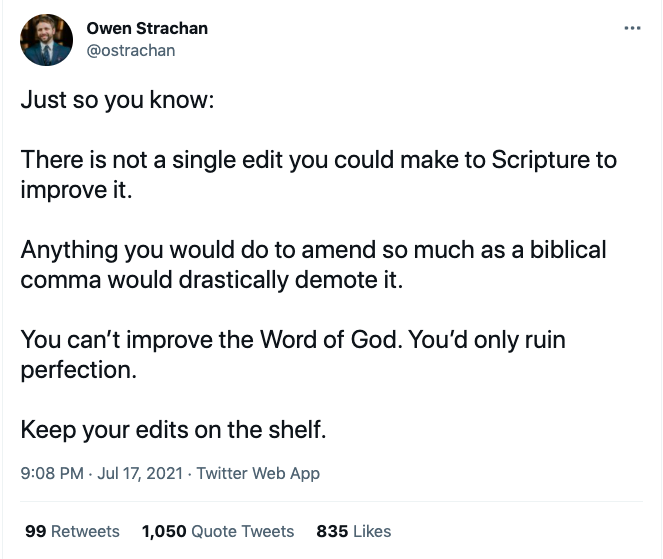I really need to start a file.
A bit ago I commented on John Piper talking about how “worry is mild form of atheism.” You, know, basically this is a totally messed way of understanding our relationship to emotions, and therefore a messed up view of how Jesus saves us from sin.
That would go in the “Things fundamentalists say about emotions.”
But tweet goes in the “Things fundamentalists say about the Bible” file.
Join me as I start a 3 part video series on
Learning to Deconstruct without Destroying Faith.
4 Comments On NOT Editing the Bible
I present Owen Strachan—who is a professor of theology (so what I’m about to say he definitely knows, which makes what he says that much more frustrating.

Let me break down each of these statements.
“There is not a single edit you could make to Scripture to improve it.”
Most conservative to moderate (and some progressive) Christians would of course agree to this.
Editing the Bible is how we got Slave Bibles which tried to make slavery OK for people. NOT GOOD.
Editing the Bible is how we got the Thomas Jefferson’s Bible which took out all the supernatural stuff (no miracles or resurrection) so that “enlightened” people would be OK with it.
So what is Strachan getting at? Why say this?
Let’s read on.
“Anything you would do to amend so much as a biblical comma would drastically demote it.”
Let’s focus on this idea of the biblical comma.
- The Hebrew (Old Testament) and Greek (New Testament) don’t use punctuation. So there ARE NO divinely inspired commas in the Bible. NONE!
- In fact, Hebrew has no vowels. And the Greek text has no spaces between words. Therefore, knowing what the words actually and what makes a sentence is a matter of interpretation, not of editing.
- AND, Jesus taught in Aramaic—so whatever the Gospels record in Greek is a translation (and therefore, interpretation) of the original Aramaic.
- AND, all of our English translations of the Bible, are TRANSLATIONS!! And translations are always interpretations at some level.
So, what Strachan is glossing over in his comment about not amending a “comma” is that we are always INTERPRETING the Bible as we read it.
Fundamentalists like Strachan are biblicists who claim to read the Bible as literally as possible, without reference to the original cultural context, past church interpretations (tradition), or general revelation.
Fundamentalist like Strachan PRETEND that interpretation isn’t always happening when we read. But we are always interpreting.
Fundamentalists like Strachan use comments like this to draw a line in the sand about inerrancy and inspiration (“No editing”) while totally ignoring the fact that all communication—including the Bible—requires a level of interpretation (and the process of “scripture interpreting scripture” is still an interpretation that someone has to do).
“You can’t improve the Word of God. You’d only ruin perfection.”
If by “Word of God” Strachan means Jesus, the Word who was with God and is God in the beginning (John 1:1-2), the “Word become flesh” (John 1:14), the “image of the invisible God” (Col. 1:15), and the “radiance of God’s glory and the exact representation of his being” (Heb. 1:3), then I agree.
We cannot improve on the perfection of Jesus.
Of course, that is not what Strachan means.
He is referring to the Bible.
And while might claim the perfections of the Bible. That doesn’t mean that our interpretations of the Bible are perfect. In fact, they are often flawed.
“Keep your edits on the shelf.”
Yes, good. We can all agree not to edit the Bible.
But what we don’t seem to agree on is that interpretation is always happening, and that Jesus is the definitive Word of God.
A High View without Bad Theology
Fundamentalists and Biblicists think they are holding a really, really high view of Scripture. But they aren’t.
I can hold to a high view of the Bible as from God (which I do) without holding shallow theological positions dressed up as “standing against secular modernism”.
And it would center on Jesus the Word.
Think you can Deconstruct Faith without Destroying It?
I DO! Join me as I start a 3 part video series on Learning to Deconstruct without Destroying Faith.


One reply on “Things Fundamentalists Say…about the Bible”
[…] examining how fundamentalists view specific texts, we need to examine how fundamentalist Christians view Scripture. They hold that the bible was dictated word for word by God Himself to the […]